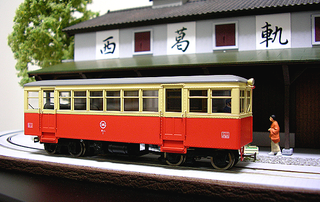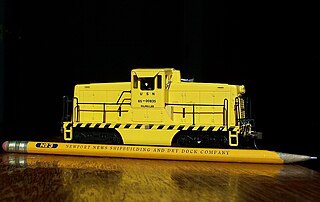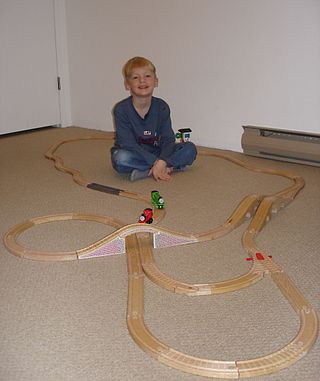Related Research Articles

Railway modelling or model railroading is a hobby in which rail transport systems are modelled at a reduced scale.

Matchbox is a popular toy brand which was introduced by Lesney Products in 1953, and is now owned by Mattel, Inc, which purchased the brand in 1997. The brand was given its name because the original die-cast "Matchbox" toys were sold in boxes similar to those in which matches were sold. The brand grew to encompass a broad range of toys, including larger scale die-cast models, plastic model kits, slot car racing, and action figures.

Airfix is a British brand and former manufacturing company which produced injection-moulded plastic scale model kits. In the UK, the name 'Airfix' has become practically synonymous with plastic models of this type, often simply referred to as "an airfix kit" even if made by another manufacturer.

Lionel, LLC is an American designer and importer of toy trains and model railroads that is headquartered in Concord, North Carolina. Its roots lie in the 1969 purchase of the Lionel product line from the Lionel Corporation by cereal conglomerate General Mills and subsequent purchase in 1986 by businessman Richard P. Kughn forming Lionel Trains, Inc. in 1986. The Martin Davis Investment Group (Wellspring) bought Lionel Trains, Inc. in 1995 and renamed it Lionel, LLC.

O scale is a scale commonly used for toy trains and rail transport modelling. Introduced by German toy manufacturer Märklin around 1900, by the 1930s three-rail alternating current O gauge was the most common model railroad scale in the United States and remained so until the early 1960s. In Europe, its popularity declined before World War II due to the introduction of smaller scales.

HO or H0 is a rail transport modelling scale using a 1:87 scale. It is the most popular scale of model railway in the world. The rails are spaced 16.5 millimetres (0.650 in) apart for modelling 1,435 mm standard gauge tracks and trains in HO.

N scale is a popular model railway scale. Depending upon the manufacturer, the scale ranges from 1:148 to 1:160. Effectively the scale is 1:159, 9 mm to 1,435 mm, which is the width of standard gauge railway. However the scale may vary to simulate wide or narrow gauge rail. In all cases, the gauge is 9 mm or 0.354 in. The term N gauge refers to the track dimensions, but in the United Kingdom in particular British N gauge refers to a 1:148 scale with 1:160 track gauge modelling. The terms N scale and N gauge are often inaccurately used interchangeably, as scale is defined as ratio or proportion of the model, and gauge only as a distance between rails. The scale 1:148 defines the rail-to-rail gauge equal to 9 mm exactly, so when calculating the rail or track use 1:160 and for engines and car wheel base use 1:148.

A toy train is a toy that represents a train. It is distinguished from a model train by an emphasis on low cost and durability, rather than scale modeling. A toy train can be as simple as a toy that can run on a track, or it might be operated by electricity, clockwork or live steam. It is typically constructed from wood, plastic or metal. Many of today's steam trains might be considered as real ones as well, providing they are not strictly scale or not enough detailed ones in favor of a robustness appropriate for children or an inexpensive production.
K-Line Electric Trains is a brand name of O gauge and S gauge model railway locomotives, rolling stock, and buildings. Formerly the brand name under which Chapel Hill, North Carolina-based MDK Inc. sold its products, K-Line was then acquired by Sanda Kan, a Chinese toy manufacturer that formerly acted as K-Line's subcontractor. Sanda Kan had licensed the use of the K-Line brand and intellectual property to Lionel. More recently, the Lionel license expired, and Sanda Kan sold the dies to several other companies, with some going to each of Atlas, Bachmann, and RMT.

OO9, often also denoted as 009 or 00-9 is a model railway scale and gauge combination of 4 mm scale and 9 mm gauge tracks, which models a prototype track gauge of 2 ft 3 in. It is a common choice in the United Kingdom for the modelling of narrow-gauge railways whose prototype gauges lie approximately between 2 ft and 2 ft 6 in. The 9 mm track gauge is used by N gauge model railways, a common commercial scale, which means that a selection of wheels, track, and mechanisms is readily available.
Z scale is one of the smallest commercially available model railway scales (1:220), with a track gauge of 6.5 mm / 0.256 in. Introduced by Märklin in 1972, Z scale trains operate on 0–10 volts DC and offer the same operating characteristics as all other two-rail, direct-current, analog model railways. Locomotives can be fitted with digital decoders for independent control. Model trains, track, structures, and human/animal figures are readily available in European, North American, and Japanese styles from a variety of manufacturers.
Hornby Railways is a British-owned model railways manufacturing company. Its roots date back to 1901 in Liverpool, when founder Frank Hornby received a patent for his Meccano construction toy. The first clockwork train was produced in 1920. In 1938, Hornby launched its first 00 gauge train. In 1964, Hornby and Meccano were bought by their competitor, Tri-ang, and sold when Tri-ang went into receivership. Hornby Railways became independent again in the 1980s, and became listed on the London Stock Exchange, but due to financial troubles reported in June 2017, became majority owned by British turnaround specialist Phoenix Asset Management.

Bachmann Industries is a Bermuda-registered, Chinese-owned company, globally headquartered in Hong Kong; specialising in model railroading.
Williams Electric Trains was an American toy train and model railroad manufacturer, based in Columbia, Maryland. Williams was sold to Kader via their subsidiary Bachmann Industries in October 2007, and is now identified as "Williams by Bachmann."

A die-cast toy is a toy or a collectible model produced by using the die-casting method of putting molten lead, zinc alloy or plastic in a mold to produce a particular shape. Such toys are made of metal, with plastic, rubber, glass, or other machined metal parts. Wholly plastic toys are made by a similar process of injection molding, but the two methods are distinct because of the properties of the materials.

Graham Farish is a company that produces large quantities of British outline model railway equipment in N gauge.

Merchandise for the Thomas & Friends franchise has been produced to capitalize on the success of the television series Thomas & Friends. Whilst merchandise was produced alongside due to the popularity of the first of The Railway Series by the Rev. W. Awdry since 1945, and the original broadcast of the television series in 1984 in the United Kingdom, large numbers of manufacturers have sought to produce Thomas-branded items after the television series was broadcast in the United States and Japan.
Kader Industrial Company Limited was founded in Hong Kong in 1948 by Ting Hsiung Chao. It was listed on the Hong Kong Stock Exchange in 1985 and presently trades under the name of "Kader Holdings Company Limited".
Britains, earlier known by the founder's name W. Britain, is a British toy brand and former manufacturing company known for its die-cast scale models of agricultural machinery, and figurines. The company was established in 1893 as a toy soldiers manufacturer.

The Train Collectors Association (TCA) is an international non-profit organization of people who operate and collect toy trains, toy train accessories, toy train books, toy train paper, and anything else rail transport related. TCA was founded in October 1954 in Yardley, Pennsylvania and is currently headquartered in Strasburg, Pennsylvania. The National Toy Train Museum affiliated with TCA is included in the "List of museums in Pennsylvania".